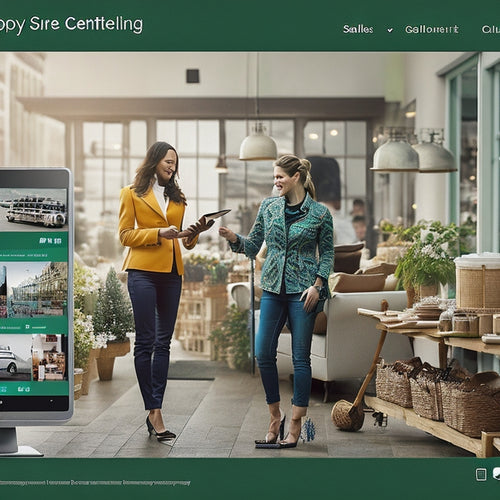
Merchant: Comprehensive E-Commerce Platform on Django, React
Share
Merchant is an all-encompassing e-commerce platform built on top of Django and React, offering a robust and scalable solution for online stores. Licensed under the MIT license, this open-source project leverages the strengths of Django and React to provide a solid foundation for e-commerce applications. With technical requirements including Python 3.9.5, Django 3.2, and React 17, Merchant guarantees a seamless integration of backend and frontend components. Material-UI is used as a required dependency for UI components. To get started, accurate installation of dependencies is vital, and a detailed guide is provided to ensure a smooth setup, revealing the full potential of this powerful e-commerce platform.
Key Takeaways
• Merchant is a comprehensive e-commerce platform built on Django and React, combining the strengths of both technologies.
• The platform is licensed under MIT, allowing free use, modification, and distribution, and encouraging community involvement and collaboration.
• To ensure a stable e-commerce platform, Merchant requires Python 3.9.5, Django 3.2, and React 17, with Material-UI as a required dependency.
• The platform's architecture is designed for scalability, providing a robust solution for online stores and a reliable e-commerce experience.
• Merchant benefits from open-source community efforts, ensuring continuous improvement through community contributions and feedback.
Project Overview and License
This all-encompassing e-commerce platform, Merchant, is built on the sturdy foundations of Django and React, and is licensed under the permissive MIT license.
The project architecture is designed to leverage the strengths of both Django and React, creating a robust and scalable e-commerce solution.
As an open source project, Merchant benefits from the collective efforts of the open source community, ensuring continuous improvement and refinement.
The MIT license allows for free use, modification, and distribution of the platform, further fostering community engagement and collaboration.
Technical Requirements and Setup
Merchant's technical foundation is built upon specific versions of Python, Django, and React, guaranteeing a stable and reliable e-commerce platform.
To guarantee compatibility and seamless integration, the following technical requirements must be met:
- Python version: 3.9.5
- Django version: 3.2
- React version: 17
- Material-UI: A required dependency for the platform's UI components
These versions have been carefully selected to provide a robust and efficient e-commerce experience. By adhering to these requirements, developers can secure a smooth setup and deployment of the Merchant platform.
Installation and Dependencies
Accurate installation of dependencies is vital to establish a fully functional e-commerce platform, guaranteeing seamless integration of Django and React components.
Setting up the Merchant platform requires meticulous attention to dependencies and requirements. The project relies on Python 3.9.5, Django 3.2, and React 17, with Material-UI as a necessary dependency.
To begin, navigate to the backend directory and run 'pip install -r requirements.txt' to install dependencies. This command ensures that all necessary components are properly installed, paving the way for a successful setup.
Frequently Asked Questions
How Do I Customize Merchant's UI Using Material-Ui Components?
To customize the UI, perform a theme overhaul by utilizing Material-UI components, ensuring component reusability by creating a modular design, and leveraging Material-UI's theming capabilities to tailor the UI to your specific requirements.
Can I Use Merchant for B2B E-Commerce Applications?
"Rome wasn't built in a day," and neither are complex B2B e-commerce applications. Merchant's modular architecture and Material-UI integration can accommodate B2B workflows, wholesale pricing, and custom UI components, making it a suitable foundation for building robust and scalable B2B e-commerce solutions.
Is Merchant Scalable for Large-Scale Enterprise E-Commerce?
When evaluating scalability for large-scale enterprise e-commerce, consider load testing to assess performance under high traffic. Utilize cloud hosting to guarantee elasticity and reliability, assuring your platform can handle increased demand without compromising performance or customer experience.
How Does Merchant Handle Payment Gateway Integrations?
Payment gateway integrations are handled through secure APIs, utilizing payment tokens to facilitate transactions while maintaining confidentiality and integrity, ensuring a seamless and reliable checkout experience for customers.
Are There Any Plans to Support Other Frontend Frameworks Besides React?
Regarding future frontend framework support, plans are underway to explore Angular integration, while a Vue possibility is also being considered, enhancing the platform's flexibility and catering to diverse developer preferences.
Related Posts
-

5 Expert Fixes for Online Store Technical Headaches
You know the stakes: every moment of downtime or sluggish loading speeds means lost sales, compromised customer trust...
-

How Do I Make My Shopify Store Profitable
This article aims to provide strategic insights and practical tips for enhancing the profitability of Shopify stores...
-

Maximizing Pinterest for Business Success
Pinterest has emerged as a valuable platform for businesses seeking to enhance their success. Boasting a substantial...


